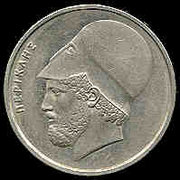Dr. Michael Delahoyde
Washington State University
PERICLES
ACT IV
Gower tells us that we are to imagine Pericles at Tyre, Thaisa at
Ephesus, and Marina growing up and educated alongside Philoten, the
daughter of Cleon and Dionyza. Mariana has always excelled, so like a
good cheerleader's mom, Dionyza has decided to have Marina killed:
"the king and queen of this determined wasteland attempt to kill
Marina, to kill the child who emblematizes the springtime and the
harvest of the land" (Garber 761). "Act IV, at its best and worst,
reads like a Jacobean Perils of Pauline, with Marina always
on the verge of being either murdered or raped" (Bloom 608).
SCENE i
Dionyza warns her servant Leonine, who will murder Marina, against
conscience and pity. The girl enters with flowers, mourning her
long-supposed-dead mother. Philoten is not accompanying her, so step-mom
advises she take a restorative stroll along the beach with Leonine lest
Daddy come back and find her looking uncared for.
Marina reports stories she's heard about her birth night. Leonine tells
her to say her prayers. She doesn't understand why Dionyza would want her
killed: "I never kill'd a mouse, nor hurt a fly; / I trod upon a worm
against my will, / But I wept for 't" (IV.i.77-79). She sees the good in
Leonine but he is resolved. As he is about to murder Marina, pirates
come. Leonine runs away and the pirates kidnap Marina. Leonine looks on,
assured that he can report her dead. But he'd better wait a minute: if
they just rape her and leave her there, he'll still have to kill her.
SCENE ii
In Mytilene, a whorehouse owner confides in his servant Boult and a woman
called just "Bawd" how difficult is it in this business to get good new
whores. But they're missing out on market opportunities with just the
three old worn-out whores.
|
Boult returns with the pirates who sell Marina to him as a high-priced
virgin and he places Marina under the tutelage of the Bawd, who doesn't
understand why she would want to have been killed earlier given the nice
life she could have now. Boult returns from advertising publicly this new
attraction at the whorehouse. He shall stir up more interest: "thunder
shall not so awake the beds of eels as my giving out her beauty stirs up
the lewdly inclin'd" (IV.ii.142-144). Marina is rather dismayed at how
commercial it all is and prays to Diana for protection. "On the stage
even more than in print Marina is a desperately touching figure as she
stands listening to their materialistic assessment of the commercial
value of her body" (Wells 335).
|

|
SCENE iii
Cleon rues the decision to have Marina killed and wonders what they'll
tell Pericles. Dionyza calls him a coward: "Why are you so foolish? Can
it be undone?" (IV.iii.1) -- echoing Lady Macbeth and already thought
by some to represent Catherine de Medici (Ogburn and Ogburn 130). They
never promised she'd live. And they'll get away with this in front of
Pericles if Cleon doesn't chicken out. This murder is actually a
kindness -- to their own daughter. Also,
Her monument
Is almost finished, and her epitaphs
In glitt'ring golden characters express
A general praise to her, and care in us
At whose expense 'tis done. (IV.iii.42-46)
Cleon calls his wife a harpy. The harpy is one of the supporters of
the coat-of-arms of the Earl of Oxford (Clark 73).
The notion of birds reporting crimes (IV.iii.21-23) is traditional
(Asimov 197).
SCENE iv
Gower apologizes for the play's ignoring linguistic diversity and tells
us that Pericles and Helicanus are sailing to Tharsus. Escanes was left
in charge at Tyre. A dumb show reveals Pericles being shown the tomb and
putting on sackcloth. Gower reports that Pericles has sworn never to wash
or cut his hair; he has put to sea and encountered another tempest. Gower
recites the monument's inscription: Dionyza's doggerel for Marina.
SCENE v
Two gentlemen mention how that new whore keeps reforming all the
brothel's customers with her fine preachings on virtue.
"Pericles is a wholly virtuous and largely passive figure, patient under
the many tribulations he has to undergo, and in his daughter Marina, child
of the sea, passivity becomes an active force after she has been captured
by pirates and cast into a brothel, opposing itself to the corruption around
her and effecting conversions by its own simple, almost mystic power" (Wells
333).
SCENE vi
The whorehouse staff stew about Marina's promotion of purity and
goodness. The city's governor, Lysimachus, arrives in disguise and
doesn't especially want v.d. "For flesh and blood, sir, white and red,
you shall see a rose, and she were a rose indeed, if she had but--"
(IV.vi.34-36). The Bawd demands that Marina treat this guy well. After
some confusing discussion at cross-purposes, Marina's story comes out:
"That the gods / Would set me free from this unhallowed place, / Though
they did change me to the meanest bird / That flies i' th' purer air!"
(IV.vi.99-102). Lysimachus hopes she doesn't think he was there for any
vile reason and he gives her some money.
Whorehouse admin. is angry and Boult is told to rape Marina. The two
discuss the relative merits of various occupations. Boult asks, "What
would you have me do? Go to the wars, would you? where a man may serve
seven years for the loss of a leg, and have not money enough in the end
to buy him a wooden one?" (IV.vi.170-173). Marina offers Boult all her
money if he'll help her out of the whorehouse and into a teaching job.
She doesn't seem to realize what a lateral move that is, but Boult agrees
to the plan.
Act V
Shakespeare Index
